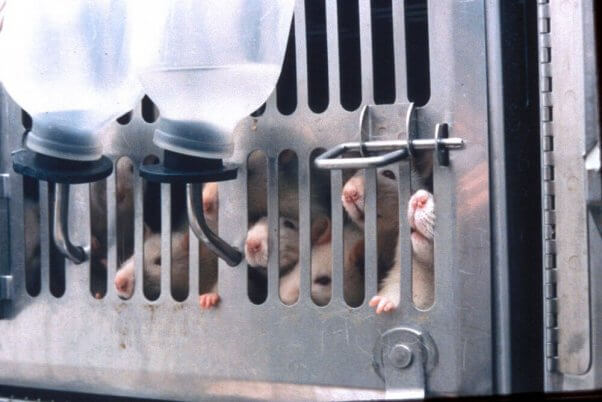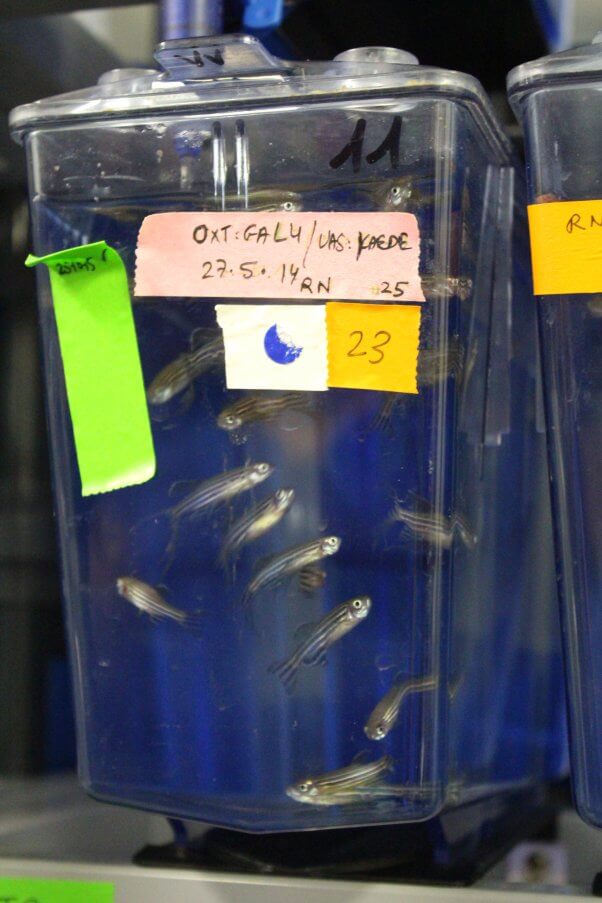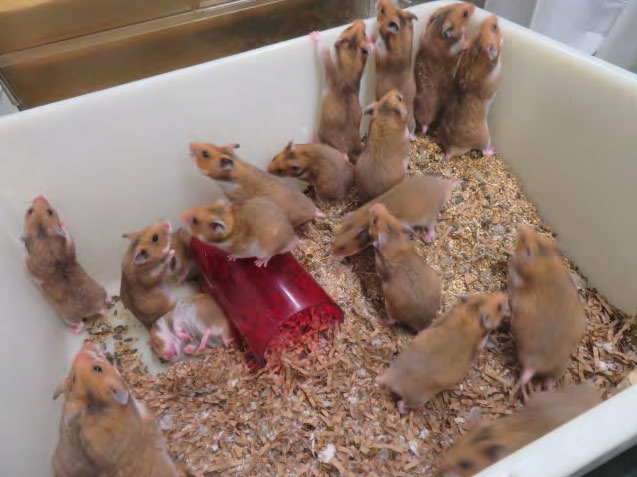PETA Exposes UMass Cruelty: Hamsters Kept in Total Darkness for Over 6 Months
Update (June 14, 2023): PETA is calling on the National Institutes of Health (NIH) to pull funding from the University of Massachusetts–Amherst (UMass) after federal reports detailed serious animal welfare violations, including that hamsters waded in inches of their own waste, endured tissue-destroying procedures, and were left in complete darkness for more than six months.
According to a federal report, a UMass experimenter subjected hamsters to a painful procedure in which layers of tissue were removed—possibly with chemicals, heat, or other gruesome methods—without first searching for an animal-free alternative, as the law requires.
UMass experimenters also kept young hamsters in constant, complete darkness for 200 days—6.5 months!—twice as long as they were supposed to be left in the dark. Federal reports revealed that a mother hamster and her infants were confined to a cage that was too small, and the animals waded in 3 inches of their own waste.
UMass experimenters also intentionally breed sickly hamsters to develop heart disease that eventually kills them. The experimenters acknowledge that the animals may become dehydrated or have difficulty reaching their food. According to another report, they’re sometimes found dead before they can be euthanized.
It seems UMass officials lack not only empathy but also willingness to follow the law. Read about other hellish UMass violations below, and then take action to help the gentle marmosets who are tormented there.
Originally posted on July 15, 2021
We have enslaved the rest of the animal creation, and have treated our distant cousins in fur and feathers so badly that beyond doubt, if they were able to formulate a religion, they would depict the Devil in human form.
—William Ralph Inge, Theologian
It’s a scene ripped from the pages of Dante’s Inferno: unabated misery, unrelenting darkness, and no escape.
But the beings condemned to suffer in this real-life hellscape aren’t souls atoning for their sins—they’re animals trapped in laboratories at the University of Massachusetts–Amherst (UMass).
University records obtained by PETA reveal horrors that could hardly be rivaled if Lucifer himself torched the place.
In one 2018 violation of animal welfare guidelines, eight mice—three adults and five babies who were just a day old—drowned when a leaking roof caused their cages to fill with water. Water from the leak also soaked mice in 15 other cages. That same year, eight zebra finches starved to death after laboratory workers forgot to put food in their cage. Staff were unable to determine how long the birds had been left with nothing to eat.

In 2019, 25 zebrafish died of overheating after a cooling system malfunctioned. Because UMass had also failed to ensure that a sensor in the room was working properly, laboratory workers didn’t notice soaring temperatures until it was too late.

And in a 2017 incident so heinous that the Devil’s right-hand demons would be impressed, experimenters failed to give necessary pain relief to several hundred mice—yeah, you read that right—who had just undergone surgery. For this egregious oversight, as with all the rest of them, UMass received little more than a slap on the wrist.
But UMass experimenters surely make Satan smile even when they’re following approved protocol. Consider, for example, the trauma inflicted on delicate marmoset monkeys: Experimenters cut out their sex organs, drill holes into their skulls, thread electrode leads through their bodies, zip-tie them into restraining devices, and—absurdly—overheat them with hand warmers to mimic menopausal hot flashes. That marmosets don’t naturally experience menopause hasn’t slowed down lead experimenter Agnès Lacreuse, who has hauled in more than $3.8 million in taxpayers’ hard-earned money to conduct the irredeemably cruel tests.
Hamsters at UMass aren’t spared, either.
Deliberately bred to develop early heart failure, the docile animals used in one protocol are left to languish without treatment for their agonizing and fatal condition. Some become so weak and lethargic that they cannot reach food or water and are forced to eat “moist nutritional gel” off the cage floor.
For other tests, experimenters leave hamsters in days- or weeks-long constant darkness, which they interrupt by flashing lights or shaking the animals’ cages to disturb their sleep cycle repeatedly and impair their heart function. When experimenters are finished with them, the small animals are killed.
It’s not only these hamsters who are living in darkness.
As long as UMass keeps the gates open to the pit of despair it calls animal laboratories, it, too, is in darkness—the moral and scientific kind. PETA scientists previously met with the university about ending some of its most devilishly cruel and useless experiments—specifically those on primates, including Lacreuse’s monstrous marmoset experiments—but it has spurned our attempts at further discussion. Join PETA in helping UMass to see the writing on the wall:

